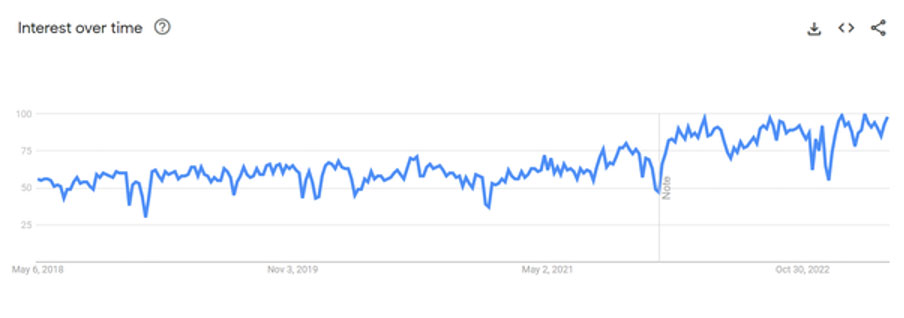Data analysis and data teams are incredibly useful and an important part of marketing teams, especially as data is collected constantly and available readily for consumption across MAPs (marketing automation platforms) and CRM platforms (customer relationship management).
What is Data Analysis?
Let’s start out by understanding what data analytics is: the process of reviewing trends within a data set (table of metrics and dimensions) to forecast changes and make informed decisions.
Why is it important?
- Provides insights into trends
- Provides insights on ROI across campaigns and time
- Allows teams to understand the target audience more effectively
- Forecasts opportunities and identify accounts for opportunities more readily
- Provides real-time decision making
Google trends even shows that searches for “data analysis” have continued to trend upward for the past 5 years! While it’s not always necessary to jump on the popularity bandwagon, in this case … it is!
Why should marketing teams care and how to ensure clean data for the analysis:
Marketing teams should invest time and effort into ensuring their data is suitable for data analysis because bad data = bad insights and untrustworthy results. For information on developing a Marketing automation process to stop data quality issues before they start, I recommend reviewing this article here.
Useful data points for marketing teams to capture:
- Person Source – this will answer First-touch and Lead-created attribution questions and start to build your lifecycle funnel picture:
- You should have fields on your site’s forms dedicated to capturing UTMs and developing a person source program to stamp that on the person’s record
- This can answer key questions about what platforms or campaigns are best at generating leads and when.
- Program membership – this will help your team to build data sets of prospect and customer behavior by capturing key engagements that a prospect or customer has taken with your brand (webinar or event attendance, form fills, registrations, etc.)
- Demographic Information – this will help your team to build data sets to support audience analysis. The type of information collectedhere can also be important for supporting the maintenance of your organization’s privacy compliance program. Having a positive working relationship with your product marketing and sales operations team can help hone in on what demographic information is useful for capturing.
Now that you have the clean data in place, let’s discuss how your marketing team can use it!
- Identify target audience: identify who your target audience is, what their interests are, and what channels they use to engage with your brand. This information can be used to develop targeted marketing campaigns that are more likely to resonate with your audience.
- Understand customer behavior: Analyzing data on customer behavior can help you understand what motivates your customers to make a purchase, what products they are most interested in, and how they prefer to engage with your brand. This information can be used to optimize your marketing strategies and improve the customer experience.
- Track campaign performance: track the performance of your marketing campaigns in real-time. By analyzing metrics such as engagement rates, conversion rates, and ROI, you can determine which campaigns are most effective and make data-driven decisions about where to allocate your marketing budget.
- Predictive analytics: By using predictive analytics, you can anticipate future trends and behaviors of your customers. This can help you develop marketing strategies that are proactive, rather than reactive, and stay ahead of your competition. Many marketing attribution platforms are using predictive analysis to help marketing teams understand what accounts are more likely to produce successful opportunities or opportunities that are more likely to end up closed/won.
- Personalization: personalize your marketing messages and experiences for individual customers. By analyzing data on customer preferences and behavior, you can deliver targeted and relevant messaging that resonates with each individual customer
Without investing time and resources into data analysis, marketing teams are missing out on the ability to make informed decisions that can be trusted and translated into actionable insights. Marketing teams should invest in training individuals on how to interpret their data to better understand their program performance or, better yet, invest in a data analyst that is dedicated and knowledgeable in transforming and understanding the data structures that your tech stack is using.
Let’s make this year the year of data analysis and level up your decision-making!







